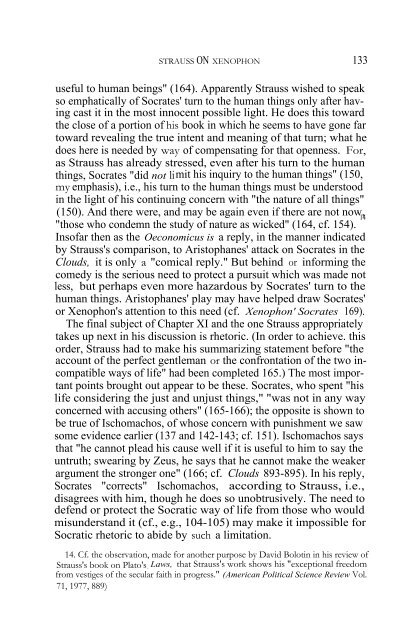Strauss on Xenophon's Socrates Xenophon's Socratic Discourse: An ...
Strauss on Xenophon's Socrates Xenophon's Socratic Discourse: An ...
Strauss on Xenophon's Socrates Xenophon's Socratic Discourse: An ...
Create successful ePaper yourself
Turn your PDF publications into a flip-book with our unique Google optimized e-Paper software.
STRAUSS ON XENOPHON 133<br />
useful to human beings" (164). Apparently <str<strong>on</strong>g>Strauss</str<strong>on</strong>g> wished to speak<br />
so emphatically of <strong>Socrates</strong>' turn to the human things <strong>on</strong>ly after having<br />
cast it in the most innocent possible light. He does this toward<br />
the close of a porti<strong>on</strong> of his book in which he seems to have g<strong>on</strong>e far<br />
toward revealing the true intent and meaning of that turn; what he<br />
does here is needed by way of compensating for that openness. For,<br />
as <str<strong>on</strong>g>Strauss</str<strong>on</strong>g> has already stressed, even after his turn to the human<br />
things, <strong>Socrates</strong> "did not limit his inquiry to the human things" (150,<br />
my emphasis), i.e., his turn to the human things must be understood<br />
in the light of his c<strong>on</strong>tinuing c<strong>on</strong>cern with "the nature of all things"<br />
(150). <strong>An</strong>d there were, and may be again even if there are not now,<br />
"those who c<strong>on</strong>demn the study of nature as wicked" (164, cf. 154). 14<br />
Insofar then as the Oec<strong>on</strong>omicus is a reply, in the manner indicated<br />
by <str<strong>on</strong>g>Strauss</str<strong>on</strong>g>'s comparis<strong>on</strong>, to Aristophanes' attack <strong>on</strong> <strong>Socrates</strong> in the<br />
Clouds, it is <strong>on</strong>ly a "comical reply." But behind or informing the<br />
comedy is the serious need to protect a pursuit which was made not<br />
less, but perhaps even more hazardous by <strong>Socrates</strong>' turn to the<br />
human things. Aristophanes' play may have helped draw <strong>Socrates</strong>'<br />
or Xenoph<strong>on</strong>'s attenti<strong>on</strong> to this need (cf. Xenoph<strong>on</strong>' <strong>Socrates</strong> 169).<br />
The final subject of Chapter XI and the <strong>on</strong>e <str<strong>on</strong>g>Strauss</str<strong>on</strong>g> appropriately<br />
takes up next in his discussi<strong>on</strong> is rhetoric. (In order to achieve. this<br />
order, <str<strong>on</strong>g>Strauss</str<strong>on</strong>g> had to make his summarizing statement before "the<br />
account of the perfect gentleman or the c<strong>on</strong>fr<strong>on</strong>tati<strong>on</strong> of the two incompatible<br />
ways of life" had been completed 165.) The most important<br />
points brought out appear to be these. <strong>Socrates</strong>, who spent "his<br />
life c<strong>on</strong>sidering the just and unjust things," "was not in any way<br />
c<strong>on</strong>cerned with accusing others" (165-166); the opposite is shown to<br />
be true of Ischomachos, of whose c<strong>on</strong>cern with punishment we saw<br />
some evidence earlier (137 and 142-143; cf. 151). Ischomachos says<br />
that "he cannot plead his cause well if it is useful to him to say the<br />
untruth; swearing by Zeus, he says that he cannot make the weaker<br />
argument the str<strong>on</strong>ger <strong>on</strong>e" (166; cf. Clouds 893-895). In his reply,<br />
<strong>Socrates</strong> "corrects" Ischomachos, according to <str<strong>on</strong>g>Strauss</str<strong>on</strong>g>, i.e.,<br />
disagrees with him, though he does so unobtrusively. The need to<br />
defend or protect the <strong>Socratic</strong> way of life from those who would<br />
misunderstand it (cf., e.g., 104-105) may make it impossible for<br />
<strong>Socratic</strong> rhetoric to abide by such a limitati<strong>on</strong>.<br />
14. Cf. the observati<strong>on</strong>, made for another purpose by David Bolotin in his review of<br />
<str<strong>on</strong>g>Strauss</str<strong>on</strong>g>'s book <strong>on</strong> Plato's . Laws, that <str<strong>on</strong>g>Strauss</str<strong>on</strong>g>'s work shows his "excepti<strong>on</strong>al freedom<br />
from vestiges of the secular faith in progress." (American Political Science Review Vol.<br />
71, 1977, 889)

















